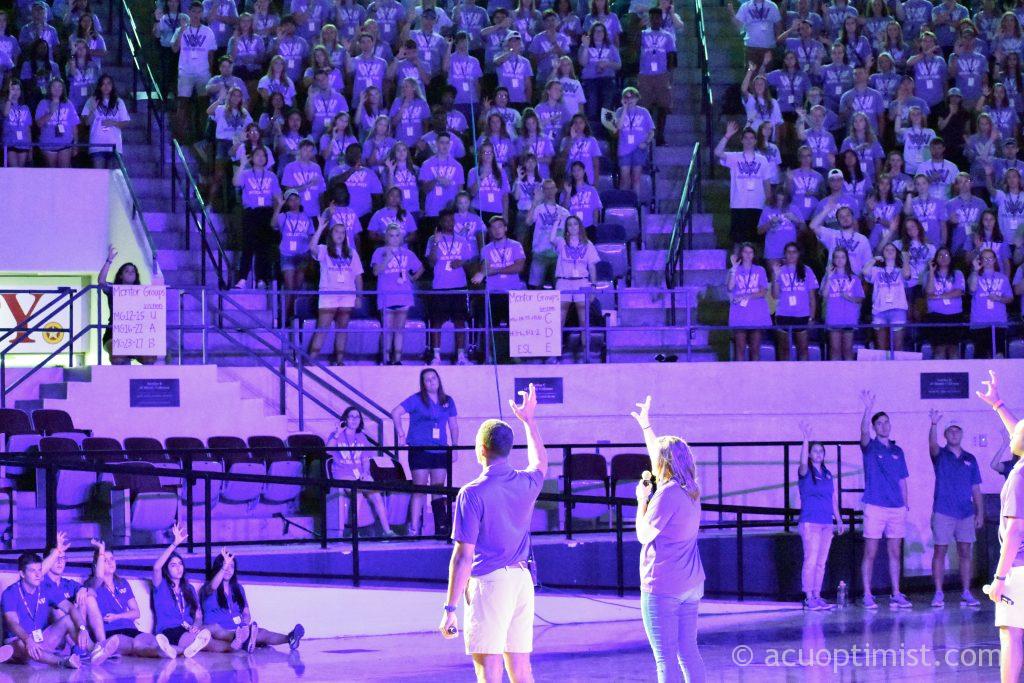The university enrolled fewer freshmen than expected this year which reflects national and state trends for freshmen enrollment, university officials said.
Kevin Campbell, vice president of enrollment management and student engagement, said the university aimed to get 1,060 new freshmen, but just 971 have enrolled at the 12th day of classes, which was Tuesday. The lower enrollment may not have a big impact on university finances because the university only budgeted for 980 freshmen, Campbell said.
“Any time your overall freshmen class slips a little bit, it does have an impact on the financial status of the institution,” Campbell said. “But ACU is extremely financially strong. More of what we need to do is realign our budget and expectation as we go into this next year.”
Across the nation, the number of freshmen enrolling in college has dropped during the last year. State schools in Texas are getting less government funding and are turning to tuition money to bolster their finances, Campbell said. Texas A&M University and Texas Tech University took more freshmen this year than in previous years, and some of those students had been considering ACU.
Throughout the last few years, the number one choice for students who were accepted at ACU but didn’t enroll was Baylor University, followed by A&M, then Tech. However, this year Campbell said Texas Tech was the number one school students chose instead of ACU.
“When they withdraw their application from ACU, we have a cancellation survey that goes out so know we where they wind up attending,” Campbell said. “We have never had more students in our pool choose Texas Tech.”
The lower freshmen enrollment could also be the result of a change in Federal Application for Student Aid (FAFSA) deadlines. Before this year, students could file the FAFSA and receive financial award letters in the spring. Campbell said this allowed the admissions team to visit high schools in the fall, then work on sending award letters in the spring. This year, students were able to file the FAFSA as early as Oct. 1. Campbell said many students received award letters and knew their financial situations before they even got a chance to visit schools.
A third reason freshmen enrollment went down could be the lower population of high school graduates nationwide. Campbell said most states have fewer high school graduates, but Texas has had a rise in high school graduates. This means more colleges outside of Texas recruited Texas high schoolers.
“Competition for Texas students has never been higher,” Campbell said. “They are telling us that they are being inundated from colleges all over America trying to recruit them.”
The university undergraduate totals have also gone down, with fewer fifth-year seniors on campus. Campbell said before the university had block tuition, only 60 percent of students graduated in four years. Now, 83 percent of students graduate in four years, which led to a decline in the total number of undergraduate students.
Still, the current junior and sophomore classes had some of the largest enrollment numbers in university history. This led to the expansion of freshmen women’s dorms to Sikes Hall and adding Dillard Hall for sophomore women. Campbell said if the university were to have two back-to-back freshmen classes of 1,070 students, all the dorms would be at maximum capacity.
“So the drop to 971 looks bigger than it really is when you compare it to the last two years,” Campbell said, “but in the last 10 years at ACU, 971 is a very good freshmen class.”
The number of students who identified as Church of Christ members declined by 3 percentage points to 27 percent. The university also saw a .5 percent increase in black students and a 1 percent increase in Hispanic students. The percentage of white students dropped from 62.63 percent to 61.29 percent.
| Undergraduate | count |
| Freshman | 1030 |
| Sophomore | 904 |
| Junior | 776 |
| Senior | 945 |
| Special Undergrad | 12 |
| Intercollegiate | 3 |
| Undergraduate Total | 3670 |
| Graduate | count |
| Special Graduate | 51 |
| Certificates | 18 |
| Master’s | 965 |
| Specialist’s | 17 |
| Doctoral | 428 |
| Graduate Total | 1479 |


